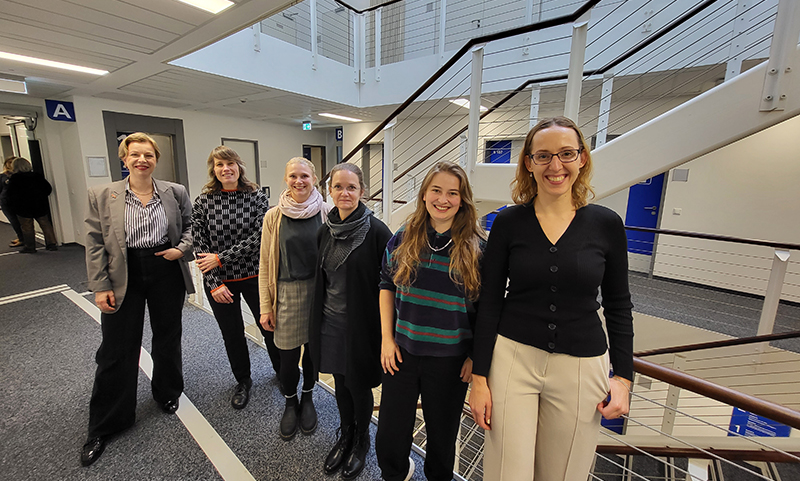News
CATALPA junior research group "Stereotype Threat" convinces reviewers
[20.12.2023]The junior research group "Stereotype Threat" under her leadership convinced the external reviewers in the interim evaluation. And today, Laura Froehlich received her habilitation certificate at the Psychology Faculty Council meeting.
 Photo: CATALPA
Photo: CATALPA
Half-time for Dr. Laura Froehlich and her junior research group "Stereotype Threat". For CATALPA, this means: the first interim evaluation is due. This is part of quality assurance at the research center. The external evaluators Prof. Dr. Tamara van Gog and Prof. Dr. Halszka Jarodzka came to a very positive conclusion.
Congratulations on the habilitation
 Foto: FernUniversität
Foto: FernUniversitätDr. Laura Froehlich received her habilitation certificate today (20.12.2023) during the Psychology Faculty Council meeting after a successful lecture on December 5. The CATALPA team congratulates her on this great success!
Anyone who knows Laura Froehlich and her work might already recon: there won’t be any surprise regarding the high quality of her work. Prof. Dr. Tamara van Gog from the University of Utrecht and Prof. Dr. Halszka Jarodzka from the Open University of the Netherlands spent a day and a half in Hagen and took a very close look at the junior research group's work. As a member of the Scientific Advisory Board, Tamara van Gog knows CATALPA well, including the quality criteria and quality assurance measures.
"As reviewers, we paid attention to various criteria: the strategic fit and the contributions to CATALPA as framing institution, of course the scientific quality and the achievements of the junior research group to date, but also the milestones and plans for the remaining time and factors such as positioning in the international research environment, personal development goals of the group members and equal opportunities. Laura Froehlich and her team were able to fully convince us in all areas," says Tamara van Gog. "We recommend CATALPA to continue the junior research group without any restriction and can only underline the relevance of the topic," continues van Gog. In mid-December, the CATALPA executive board confirmed the positive result of the interim evaluation on the basis of the external report and thus decided to extend the junior research group.
Who is affected by stereotypes in distance education?
The Stereotype Threat junior research group started two and a half years ago. Since then, Laura Froehlich and doctoral student Natalie Bick have been working primarily on questions such as: Which groups are affected by stereotype threat in distance education and to what extent? In a digital learning environment in particular, individualizing information about people is rare. Often only a name and profile picture remain, so that stereotypes about group affiliations (e.g. gender, cultural background) are more easily activated. The junior research group was able to show that in the distance education context, students with a migration background, non-native speakers and students with disabilities or chronic illnesses have a higher risk of being negatively stereotyped in areas such as conscientiousness, ability, trustworthiness and friendliness. The impact: less interaction with other students and a lower sense of belonging with consequences for performance and collaboration in virtual learning groups.
Realizing your full academic potential
The relevance for effective interventions, which Laura Froehlich and her team will be addressing in various studies over the next two years, is therefore clear. "We see the potential to close gaps between traditional and non-traditional students. They could better realize their full academic potential and interactions between students with diverse personal backgrounds could be significantly improved in virtual student groups," explains Laura Froehlich.
Adaptive measures
"The long-term goal is to develop an algorithm that adaptively indicates interventions only to those students who are at risk of harmful stereotyping," says the scientist. Research projects for this are currently underway. For example, the junior research group, in collaboration with Prof. Dr. Stefan Stürmer, acquired DFG funding for the MULTIDIVERSE-CSCL project, which will begin in January 2024. As part of the project, the researchers are investigating how exactly stereotypes influence collaboration in virtual learning groups and will develop intervention measures to support learning groups digitally. The data for this comes from a psychology module on the Bachelor's degree course. In spring 2024, Nathalie Bick will also spend an 8-week research stay in the "Future of Learning Lab" research group led by Prof. René Kizilcec at Cornell University to finalize interventions to reduce stereotype threats with the experts there and then test them in a course at the FernUniversität in Hagen. The study will also be part of the new DECIDE project, about which more information will soon be available on the CATALPA website.

